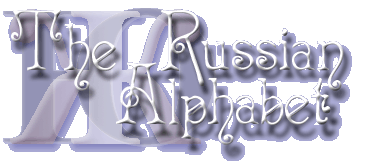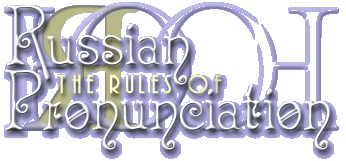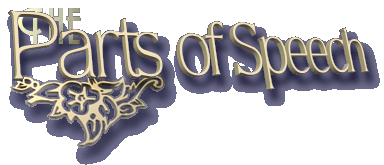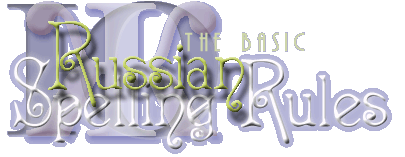|

The Russian words in the following list are all written with the Cyrillic alphabet but if you
read them carefully, one word at a time, from top to bottom beginning at the top of the left-hand column, by the time you
reach the final word in the lower right-hand corner, you will know the Cyrillic alphabet (as well as a few Russian words).
Use the Greek letters you know to help. There is also a helpful table on the next page. The fonts you need for this page may
be found HERE. |
|
| COLUMN ONE |
COLUMN TWO |
| мама |
granny's kid |
вулкан |
a geological zit |
| папа |
the other granny's kid |
табак |
avoid this |
| акт |
part of a play |
бар |
an urban oasis |
| парк |
a rest area |
банан(а) |
fruit with appeal |
| порт |
any is fine in a storm |
балет |
home of the tu-tu |
| террор |
Stalin's forte |
публика |
John Q.'s last name |
| метеор |
falling star |
парламент |
British legislature |
| доктор |
has infinite patients |
крокодил |
Capt. Hook's nemesis |
| трактор |
what farmers ride |
президент |
US head honcho |
| термометр |
it has a lot of degrees |
физика |
a natural science |
| математика |
the unnatural science |
базар |
a bizarre market |
| Америка |
Yuwessov, A. |
кризис |
a major problem |
| Арктика |
go there for goosebumps |
виза |
you need it to travel |
| радио |
it talks and rocks |
визит |
the shorter the better |
| радиатор |
a source of warmth |
фантазия |
like, unreal! |
| драма |
unfunny stuff |
формула |
chemical recipe |
| Африка |
a major continent |
апрель |
a springy month |
| факт |
something undeniable |
культура |
I ain't got none of it |
| фронт |
put up a good one |
календарь |
where you get dates |
| танк |
heavy-duty vehicle |
техника |
technical stuff |
| патент |
protector of inventions |
механик |
the car-fixer |
| Антарктика |
opposite of Арктика |
характер |
personality |
| капитан |
the boat's boss |
хоккей |
ice game |
| митинг |
let's all get together |
медицина |
does good; tastes bad |
| план |
a good idea |
циник |
stick-in-the-mud |
| гранит |
a hard stone |
цемент |
heavy stuff |
| грамм |
European measure |
цифр |
figures |
| гол |
where you score |
цивилизация |
results of civil engineering? |
| металл |
heavy stuff |
Вашингтон |
Gridlocksville, USA |
| телефон |
distant sound machine |
машина |
mechanical device |
| телеграф |
Western Union |
галоши |
rubbers |
| телеграмма |
a wire |
шарлатан |
an insincere guy |
| лампа |
it sheds much light |
Хрущёв |
former Party chief |
| ангел |
a feathered friend |
борщ |
Russian soup |
| Италия |
the boot country |
экспорт |
take it away! |
| Германия |
Reunited at last! |
эскалатор |
the way upstairs |
| Англия |
Hail Brittania! |
экватор |
some like it hot |
| армия |
big bunch of fighters |
поэт |
writes pomes |
| салат |
uncooked greens |
Югославия |
former Balkan nation |
| аспирин |
headache med'cine |
юмор |
Russian Program forte |
| сигара |
product of Cuba |
бюрократ |
Soviet deadwood |
| министр |
government official |
нюанс |
it's easy to miss |
| сенат |
US deadwood branch |
мираж |
it's not what it seems |
| сенатор |
US political deadwood |
журнал |
a magazine |
| система |
organization |
журналист |
a журнал worker |
| сигнал |
it let's you know |
жасмин |
tea flower |
| авиатор |
a flyer |
Женева |
Swiss city |
| ветеран |
s/he's been around |
жакет |
goes with a tie |
| витамин |
health pills |
жираф |
an excellent necker |
| веранда |
where Southern belles sit |
чемпион |
the guy with the gold |
| вампир |
suave blood-sucker |
Шанхай |
city in China |
| Волга |
famous Russian river |
Нью Йорк |
The Big [Red Fruit] |
| студент |
an easy job |
май |
another spring month |
| университет |
sports-fraternity complex |
гейзер |
a worthless gusher |
| аудитория |
a good place to spectate |
Чайковский |
big Russky composer |
| литература |
like, uh, novels & pomes |
музыка |
tunes |
| август |
a summery month |
шашлык |
shishkabob |
Now that you have mastered the Cyrillic alphabet, try it out on some real Russian signs at Tom Beyer's Russia Today site.

Since Russian is such an easy language, it has very few pronunciation rules; by and large words are pronounced
the way they are spelled and vice versa. Every time you want to say 'oo' you write y and you always pronounce y
'oo'. Whenever this is not the case, the pronunciation varies by strict, easy-to-follow rules which are provided on this page.
Let's begin with the basic sounds associated with the letters of the Cyrillic alphabet in Russian.
| TABLE 1: Basic Russian Pronunciation |
Russian
Letter |
Pronunciation |
Russian
Letter |
Pronunciation |
| a |
'Ah!' but short |
р |
'r' as in Scots 'run' |
| б |
'b' as in 'bet' |
с |
's' as in 'set' |
| в |
'v' as in ''Vette' |
т |
't' as in 'Tet' |
| г |
'g' as in 'Gucci' |
у |
'Oo!' but short |
| д |
'd' as in 'dad' |
ф |
'f' as in 'fifty' |
| е |
'Yay!' but short |
х |
'kh' in Scots 'loch' |
| ё |
'Yo!' as in 'Yo, dude!' |
ц |
'ts' as in 'lets' |
| ж |
'zh' as in 'azure' |
ч |
'ch' as in 'church' |
| з |
'z' as in 'zit' |
ш |
'sh' as in 'shush' |
| и |
'ee' but short |
щ |
'shch' 'fresh cheese' |
| й |
'y' as in 'Yuck!' |
ъ |
hard sign |
| к |
'k' as in 'kit' |
ы |
between 'i' and 'u' |
| л |
'l' as in 'let' |
ь |
soft sign |
| м |
'm' as in 'met' |
э |
'Eh?' (short) |
| н |
'n' as in 'net' |
ю |
'yu' as in 'you' |
| о |
'Oh!' but short |
я |
'ya' as in 'yacht' |
| п |
'p' as in 'pet' |
There are three basic exceptions to these one-one correspondences between letter and sound in the pronunciation
of vowels and two exceptions in the pronunciation of consonants. There are a couple of additional minor exceptions which will
not be discussed here.
1. The Akanie and Ikania Rules.
The akanie and ikanie rules are pronuniation rules which apply to the central dialects of Russian
to which Muscovite Russian belongs. According to akanie, an unaccented 'o' is pronounced 'a' in the syllable immediately
preceding the accent and 'uh' as in 'but' elsewhere. The ikanie rule states that unaccented 'e', 'ё', and 'я'
are pronounced the same as 'и'. You may listen to the words exemplifying akanie and ikania in the table
below by clicking them with your mouse. Accented syllables are in boldface type. Notice that an unaccented 'o' and 'a' sound
identical in the syllable immediately preceding the accent and an unaccented 'e' sounds identical to 'и'.
2. Devoicing at the End of Words
In addition to the hard and soft consonants in Russian, the distinction 'voiced' and 'voiceless' consonants
is also important. Table 3 shows the voiced-voiceless pairs of consonants in Russian. These consonants are identical except
that the vocal chords vibrate when we produce the voiced consonants and they don't when we produced voiceless ones. (You can
distinguish these pairs by holding your throat when you pronounce them slowly; English maintains the same distinction.)
3. Adjusting the Voicing of Consonant Clusters
Whenever two or more of the consonants in Table 3 occur within a phonological word (a word or cluster of
words sharing a single accent), the final consonant determines the voicing for all. In other words, if the final consonant
is voiced, all will be voiced, if the final consonant is voiceless, all will be voiceless.
Now try Agama's Speaking Mouse to hear any phrase you wish spoken in synthesized Russian. (Change your font encoding to 'Windows 1251'.)

 ou have probably heard the traditional definitions of the part of speech, e.g. that nouns are words that denote 'persons,
places, or things' and verbs are words that denote actions. It probably occurred to you that, well, persons and places are
things, so why not just 'nouns are words that denote things'? And sit and sleep are verbs but they hardly denote
actions. In fact, nouns do represent concepts as things, verbs as actions or states, and adjectives as qualities. Take the
concept 'quick', for example. It is basically an adjective, so it indicates a quality, i.e. a characteristic of something
else. However, the same concept may be represented in the language as a noun (quickness), a verb (quicken),
or as an adverb (quickly). ou have probably heard the traditional definitions of the part of speech, e.g. that nouns are words that denote 'persons,
places, or things' and verbs are words that denote actions. It probably occurred to you that, well, persons and places are
things, so why not just 'nouns are words that denote things'? And sit and sleep are verbs but they hardly denote
actions. In fact, nouns do represent concepts as things, verbs as actions or states, and adjectives as qualities. Take the
concept 'quick', for example. It is basically an adjective, so it indicates a quality, i.e. a characteristic of something
else. However, the same concept may be represented in the language as a noun (quickness), a verb (quicken),
or as an adverb (quickly).
| Adjective |
Quick fingers, for example, are fingers with the suspicious quality or characteristic
of quickness. 'Quick' is an adjective. |
| Noun |
The noun, quickness, represents the same concept, quickness, as a thing, in this case
an abstract thing but thing nonetheless. |
| Verb |
In the phrase she quickened the pace the same concept turns up representing an action, so it
must be a verb. |
| Adverb |
Finally, in she quickly removed her cigar, the same concept represents a characteristic of an
action. In this case it is an adverb. |
These are semantic definitions of the major parts of speech. In Russian the parts of speech are also formally
distinguished by different sets of endings. Nouns and adjectives have declensional endings which are distinct from each other and different from the verbal conjugation endings. The type of adverb described in the table is simply an adjective modifying a verb and usually sports
a neutral, non-agreeing -o ending. The other type is the "Delimiter" (for which see below). So it is easy to distinguish the major parts of speech in Russian; they are both formally and semantically
definable. Just follow the links to the formal definitions of the Russian parts of speech.
Pronouns might be divided up into 'pronouns', 'pro-verbs' (as opposed to 'proverbs', which none of
them are), 'proadjectives', and 'proadverbs' because they belong formally and semantically to the major parts of speech classes.
They are minor major parts of speech. He, she and it in English, for example replace nouns like John, the
house, and the girl. Which, as in which book, replaces an adjective, e.g. the red book. Do
in English is a kind of 'pro-verb', for it replaces any verb: What did you do? : I oversurfed.
The other minor parts of speech found in Russian include:
| Pronouns |
words that replace nouns but also adjectives, adverbs, and verbs, e.g. I, you, he, she, it;
this, that; there, where—and do is the English verbal pronoun |
| Prepositions |
things that explain the relations between the major parts of speech like in, on, to, for,
betwixt and between |
| Conjunctions |
things that connect the major parts of speech or clauses within the sentence, such as if, and or
but |
| Particles or Delimiters |
small items that add peripherally to the meaning like, well, like, so, too, and sorta |
(Russian gets along fine without articles like English a and the, thank you. This is one of
the reasons that is is so simple!)
THE BASIC  |
 IN ORDER TO IN ORDER TO |
| grammatical terms for language learning in general may be
found on Jerry Mead's 'Glossary Wizard'. Keep in mind that the rules on this page assume that you have already mastered the Basic Spelling Rules of Russian. |
learn how to form Russian verbs next, you must know the basic spelling
rules of Russian and apply them after the rules discussed here are applied. If you are not sure of them, review them now before
proceeding. |
 |
| The Russian |
| spelling system is far simpler than that of English. The system is basically
this: one sound, one letter; one letter, one sound. There are a few disparities, but only a few. To give you an idea of just
how few: they are all just below on this one page. Russian kids learn them by the end of first grade; if you are past this
stage, you should pick them up with no difficulty. Right? |
1. Hard and Soft Vowels. Russian has a system of 'soft' or 'palatalized' consonants which parallels that of the regular consonants. (Soft consonants
are pronounced as though you were pronouncing that consonant and a 'y' simultaneously.) Fourteen Russian consonants come in
soft-hard pairs and, if the Russian alphabet assigned a distinct consonant for each, we would have to memorize fourteen additional
consonant letters.
However, because they want their language to remain the simplest language in the world, the Russians decided
to use the following vowel to indicate whether the preceding consonant is hard or soft. Since the Russian language has only
5 distinct vowel sounds, this system requires only 5 additional letters. This saves the Russian-language learner 9 letters
to memorize! Here are the 10 vowel letters which indicate whether the preceding consonant is 'hard' or 'soft'. Remember, each
vowel of the pair is pronounced identically, except for the ы and the и. The approximate pronunciation
is given to the right.
The vowel letters in the left column occur only after 'hard' consonants; those in the right column appear
only after 'soft' consonants.
You must remember that, after applying all the other rules of Russian, especially when adding noun, verb,
and adjectives endings, you must be sure to convert any 'hard consonant' vowel to its 'soft' alternate, if the suffix begins
with a vowel and is added to a stem ending on a consonant.
Also, if any word ends on a vowel from the right-hand column, then its stem ends on a soft consonant, so
when changing the endings on such words, you must consistently use the vowels from the 'soft' column. The following table
shows what I mean. [For best results in studying this table, focus on one word at a time and follow the change in each
word. Begin with the forms in the left columns; they provide you with the basic vowel used after hard consonants. The right-hand
column shows you the rule for converting the basic vowel to the vowel used after a soft consonant.]
|
| Table II: Vowel Alternations after Soft Consonants |
after hard
consonants |
Examples |
after soft
consonants |
Examples |
| C + а |
стол-а |
Cь + а > я |
 |
| C + e |
стол-е |
Cь + е > е |
 |
| C + ы |
стол-ы |
Cь + ы > и |
 |
| C + о |
окн-о |
Cь + о > ё |
 |
| C + у |
стол-у |
Cь + у > ю |
 |
|
"Cь" = any soft consonant in the table above. To compare the use of the 'soft' vowels after soft consonants
(Cь) and the 'hard' vowels after hard consonants (C), examine the table below. Женя is
the nickname for Евгений "Eugene" or Евгения
"Eugenia" and жена means "wife". Table III shows some of them in their various case forms.
| Table III: Hard & Soft Consonants |
| Nominative |
жена |
Женя |
| Genitive |
жены |
Жени |
| Accusative |
жену |
Женю |
| Instrumental |
женой |
Женей |
2. The Combination of й+V (y+vowel) Russian orthography does not allow spellings with й
(jod) plus a vowel, that is, й+а, й+э, й+ы, й+о, й+у. Instead,
the "soft" vowels are also used to indicate these combinations, as the following table illustrates.
| Table IV: Jod + Vowel Combinations |
| стол-а |
'of a table' |
 |
'of a genius' |
| стол-ы |
'tables' (Pl) |
 |
'geniuses' (Pl) |
| стол-ом |
'with a table' |
 |
'by the genius' |
| стол-у |
'to a table' |
 |
'to the genius' |
In their attempt to simplify their alphabet for us, the Russians developed a spelling system that leaves
us another problem: how to indicate the softness of consonants at the end of words or before other consonants, i. e. when
no vowel follows. If the consonant is hard--no problem: стол "table". However, if the consonant is
soft, a soft sign (ь) must be added to distinguish the soft consonant from its corresponding hard variant, e.g.
мать "mother", дверь "door", день "day"; только
"only", судьба "fate", просьба "request".
3. The 7 Consonant Rule. Also remember that after к г х (velars) and ш ж щ ч (hushes) never
write ы but always и, e.g. студенты "students" but студентки
"coeds", лифтёры "elevator operators" but лифтёрши
"women elevator operators".
4. The 5 Consonant Rule. After ш ж щ ч ц write o if that syllable is accented and e if it is not,
e.g. в большом хорошем доме "in a big nice house". (The light letters
indicate accent placement.)
5. The Hush Rule. Finally, after hushes (ш ж щ ч) never write я
or ю but always а and у.
Bucknell University, Lewisburg, PA 17837
|





 ou have probably heard the traditional definitions of the part of speech, e.g. that nouns are words that denote 'persons,
places, or things' and verbs are words that denote actions. It probably occurred to you that, well, persons and places are
things, so why not just 'nouns are words that denote things'? And sit and sleep are verbs but they hardly denote
actions. In fact, nouns do represent concepts as things, verbs as actions or states, and adjectives as qualities. Take the
concept 'quick', for example. It is basically an adjective, so it indicates a quality, i.e. a characteristic of something
else. However, the same concept may be represented in the language as a noun (quickness), a verb (quicken),
or as an adverb (quickly).
ou have probably heard the traditional definitions of the part of speech, e.g. that nouns are words that denote 'persons,
places, or things' and verbs are words that denote actions. It probably occurred to you that, well, persons and places are
things, so why not just 'nouns are words that denote things'? And sit and sleep are verbs but they hardly denote
actions. In fact, nouns do represent concepts as things, verbs as actions or states, and adjectives as qualities. Take the
concept 'quick', for example. It is basically an adjective, so it indicates a quality, i.e. a characteristic of something
else. However, the same concept may be represented in the language as a noun (quickness), a verb (quicken),
or as an adverb (quickly). 